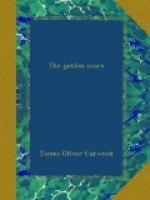“I swear it!” repeated Pierre.
Something that was almost eagerness was burning now in Philip’s face. He leaned over the table, his hands gripping tightly. He was thirty-five; almost slim as Pierre himself, with eyes as steely blue as Pierre’s were black. There was a time, away back, when he wore a dress suit as no other man in the big western city where he lived; now the sleeves of his caribou skin coat were frayed and torn, his hands were knotted, in his face were the lines of storm and wind.
“It is impossible,” he said. “Bram Johnson is dead!”
“He is alive, M’sieu.”
In Pierre’s voice there was a strange tremble.
“If I had only heard, if I had not seen, you might disbelieve, M’sieu,” he cried, his eyes glowing with a dark fire. “Yes, I heard the cry of the pack first, and I went to the door, and opened it, and stood there listening and looking out into the night. Ugh! they went near. I could hear the hoofs of the caribou. And then I heard a great cry, a voice that rose above the howl of the wolves like the voice of ten men, and I knew that Bram Johnson was on the trail of meat. Mon dieu—yes—he is alive. And that is not all. No. No. That is not all—”
His fingers were twitching. For the third or fourth time in the last three-quarters of an hour Raine saw him fighting back a strange excitement. His own incredulity was gone. He was beginning to believe Pierre.
“And after that—you saw him?”
“Yes. I would not do again what I did then for all the foxes between the Athabasca and the Bay, M’sieu. It must have been—I don’t know what. It dragged me out into the night. I followed. I found the trail of the wolves, and I found the snowshoe tracks of a man. Oui. I still followed. I came close to the kill, with the wind in my face, and I could hear the snapping of jaws and the rending of flesh—yes—yes—and A man’s terrible laugh! If the wind had shifted—if that pack of devils’ souls had caught the smell of me—tonnerre de dieu!” He shuddered, and the knuckles of his fingers snapped as he clenched and unclenched his hands. “But I stayed there, M’sieu, half buried in a snow dune. They went on after a long time. It was so dark I could not see them. I went to the kill then, and—yes, he had carried away the two hind quarters of the caribou. It was a bull, too, and heavy. I followed—clean across that strip of Barren down to the timber, and it was there that Bram built himself the fire. I could see him then, and I swear by the Blessed Virgin that it was Bram! Long ago, before he killed the man, he came twice to my cabin—and he had not changed. And around him, in the fire-glow, the wolves huddled. It was then that I came to my reason. I could see him fondling them. I could see their gleaming fangs. Yes, I could hear their bodies, and he was talking to them and laughing with them through his great beard—and I turned and fled back to the cabin, running so swiftly that even the wolves would have had trouble in catching me. And that—that—was not all!”




